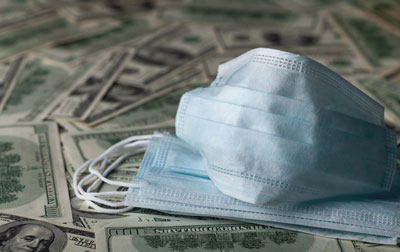
The White House and the U.S. Senate early this morning, March 25, agreed on a $6 trillion bipartisan economic stimulus package to combat the financial effects of the COVID-19 pandemic and assist the Federal Reserve. Some $2 trillion of the measure will assist businesses, workers, and health care systems.
The Senate is expected to vote on the measure today. It still has to be passed by the House of Representatives and signed by President Trump.
White House economic adviser Larry Kudlow on Tuesday projected that the total economic stimulus to be enacted by the federal government will reach $6 trillion.
Of the total, $4 trillion will come in the form of liquidity from the Federal Reserve, while the remaining $2 trillion will be part of proposed phase-three legislation from Congress. If the total assistance does reach $6 trillion, it would equal about 30 percent of U.S. GDP.
The phase-three legislation will be “the single largest Main Street assistance program in the history of the United States,” Kudlow said at a press conference Tuesday evening. “We’re heading for a rough period, but it’s only going to be weeks, we think. Weeks [or] months, but it’s not going to be years, that’s for sure.”
The bill includes a $500 billion fund to help hard-hit industries, a comparable amount for direct payments of up to $3,000 apiece to millions of U.S. families, $350 billion for small-business loans, $250 billion for expanded unemployment aid, $150 billion for various healthcare initiatives, including $100 billion for hospitals and related health systems, according to Reuters.
If passed, it would be the largest rescue package in U.S. history and the third approved by Congress this month to counter the impact of the crisis.
It would give direct payments to most Americans, expand unemployment benefits and provide a $367 billion program for small businesses to keep making payroll
One of the last issues to close concerned $500 billion for guaranteed, subsidized loans to larger industries, including a fight over how generous to be with the airlines. Hospitals would get significant help as well.
“After days of intense discussions, the Senate has reached a bipartisan agreement on a historic relief package for this pandemic,” said Majority Leader Mitch McConnell, R-Ky., a key negotiator. “It will rush new resources onto the front lines of our nation’s health care fight. And it will inject trillions of dollars of cash into the economy as fast as possible to help Americans workers, families, small businesses and industries make it through this disruption and emerge on the other side ready to soar.”
Included in the package is Congress’ almost $2 trillion emergency bill which, when passed, will issue direct checks for American families, bailouts for the airline industry and a $350 billion loan program for struggling small businesses.
The other $4 trillion will allow the Federal Reserve to make huge emergency bailouts to whatever entity it chooses.
“To the American people, we say, big help, quick help is on the way,” Senate Minority Leader Chuck Schumer, D-N.Y., said Wednesday morning on CNN.
Over the last two days, the bill was delayed as Democrats sought to add favored projects, including:
- $300 million in funding for public broadcasting;
- New emissions standards for airlines and a requirement of full carbon offset by 2025;
- Required same-day voter registration and early voting;
- Government funded retirement plans for community newspapers;
- $1 billion “Cash for Clunkers”-style program where the government buys garbage planes from airlines;
- $1.5 million to study climate change mitigation efforts in civil aviation and aerospace industries;
- New and burdensome OSHA requirements on hospitals; and,
- $1 billion for taxpayer funded cell phones.
It is believed most, or all of the late-hour measures will not be in the final bill.





